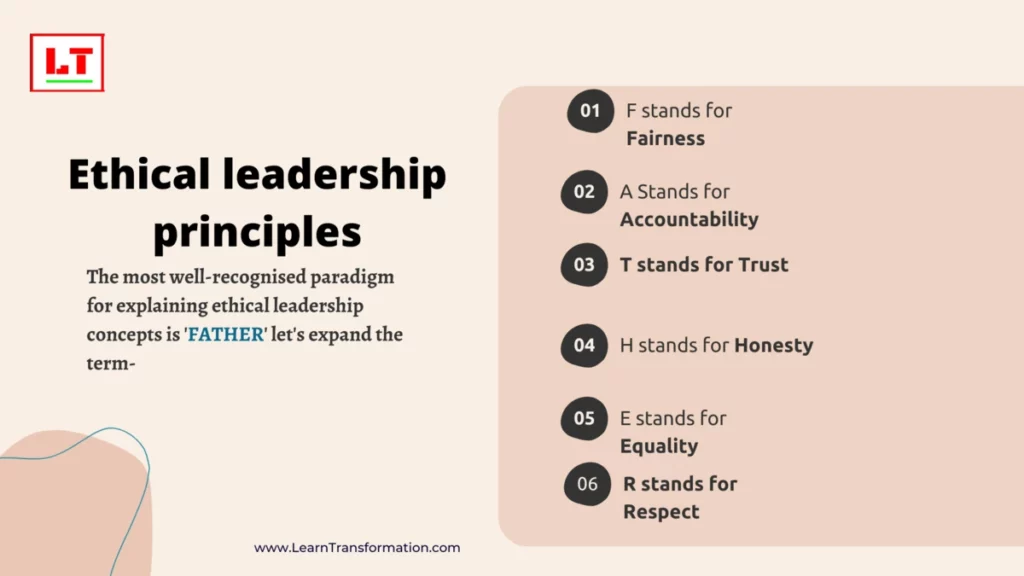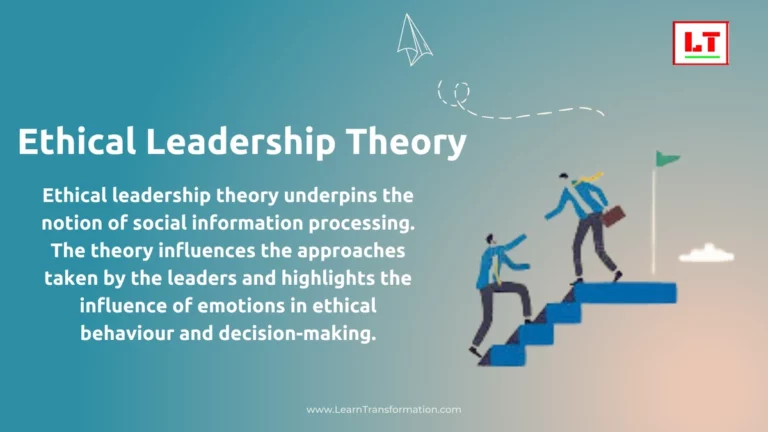Ethics and oversight are what you eliminate when you want absolute power.
What is Ethical Leadership?
Definition- Ethical Leadership is a practice in which leaders perform appropriately in accordance with established principles and ideals and as a result, motivate/influence others to do the same.
- What is Ethical Leadership?
- Who is an Ethical leader?
- What is Ethical Leadership Theory?
- What are 5 Main Characteristics?
- Important Principles Of Ethical Leader
- How Ethical Leadership in various fields works?
- How’s Ethical Leadership different from Moral Leadership?
- What are 5 Advantages & Disadvantages of Ethical Leadership?
- 5 Ethical Leadership Books
- 5 best leadership quotes
Who is an Ethical leader?
Firstly, let’s understand who is a ethical leader, A person who demonstrates strong moral principles, leadership values and ethics, sets an example for the rest of the firm, and wants their employees to respect and follow his lead with the same principles.
What is Ethical Leadership Theory?
Further, This theory underpins the notion of social information processing. Further, The theory influences the approaches taken by the leaders and highlights the influence of emotions in ethical behaviour and decision-making.
Check it out – 10 Best Leadership Styles & Leadership Qualities in VUCA World
Leader’s Tip
Lead by example: Model ethical behaviour, uphold moral ideals, and foster an organisational culture of integrity.
What are 5 Main Characteristics?
So, Here are the traits of an ethical leader-
- Focused
- Have High raised morals
- Promotes open communication
- Positive and unselfish attitude
- Adapts to change
Important Principles Of Ethical Leader
The most well-recognized paradigm for explaining this concepts is ‘FATHER’ let’s expand the term-
- F stands for Fairness
- A Stands for Accountability
- T stands for Trust
- H stands for Honesty
- E stands for Equality
- R stands for Respect

How Ethical Leadership in various fields works?
- In education field – In any case, Moral leadership and decision making in education are important aspects. Further, The United Kingdom’s Ethical Leadership Commission initiated a framework for ethical Leadership in education. Furthermore, Every choice and action taken by educational leaders should encourage ethical behavior. In addition to this, Educators must use every chance to display the principles and morals that students will rely on for ethical direction throughout their lives through their actions.
- In healthcare field – Leadership training in healthcare should involve the development of abilities on how to act morally in public, with patients and how to establish and communicate clear moral. Then, standards to staff. Regardless of their management roles, it is imperative for all healthcare professionals to provide their services with a constant awareness of their inherent leadership responsibilities. By acknowledging their role as leaders, healthcare professionals can effectively contribute to the well-being of patients and the overall healthcare system.
And lastly, All professionals should be aware of their “Ethical leadership” obligations from the beginning of their schooling to the end of their careers.
How’s Ethical Leadership different from Moral Leadership?
Moral leaders inspire and teach others to build their moral qualities.Accordingly, Moral Leadership is not dependent on one’s position or rank; anybody may be a moral leader. In contrast, this leadership influences the approaches taken by the leaders and highlights the influence of emotions in moral behavior and decision-making.
- Ethical and Effective Leadership
Effective and Ethical Leadership are two aspects of Leadership that are inextricably linked. Moreover, Effective Leadership is concerned with developing, implementing, and realizing a goal. In contrast, another theory is concerned with whether the vision or aim is ethically sound for the entire community.
- Unethical Leadership
Unethical Leadership can be defined as Behaviors committed and decisions made by organizational leaders that are illegal and violate moral norms, as well as those that impose processes and structures that foster unethical activity by followers.
Check it out – 10 Ways to Become a Good Autocratic Leader in VUCA World.
Leader’s Tip
Promote ethical awareness: Encourage open communication, ethics training, and employees to speak up about ethical concerns.
What are 5 Advantages & Disadvantages of Ethical Leadership?
Advantages
- Creates a healthier work environment
- Ensures proper following of laws
- Increases conscientiousness
- Fosters accountability.
- Enhances consistency
Disadvantages
- Requires extensive assistance.
- It is an expensive leadership style to deploy
- Relies on individual consistencies.
- It is reliant upon the ability of a leader to influence others
- May have numerous meanings.
5 Ethical Leadership Books
Some books to enhance your knowledge-
- You Have More Influence Than You Think by Vanessa Bohns
- The Ethical Leader: Why Doing the Right Thing Can Be the Key to Competitive Advantage by Morgen Witzel
- Ethical Leadership – Concepts and Cases on Ethics in Governance by Smarak Swain
- The Ethics of Leadership by Dr Christopher M Powell
- Ethical Leadership Progress with a Moral Compass BY Joan Marques
Check out this video:
5 best leadership quotes
Leadership lessons by some renowned leaders-
- It is better to lead from behind and put others in front, especially when you celebrate victory when nice things occur. You take the front line when there is danger. Then people will appreciate your Leadership. Nelson Mandel
- The supreme quality of Leadership is integrity. Dwight Eisenhower
- Leadership is the art of getting someone else to do something you want done because he wants to do it.Dwight D. Eisenhower
- A good objective of Leadership is to help those who are doing poorly to do well and to help those who are doing well to do even better. Jim Rohn
- Leadership is a series of behaviors rather than a role for heroes. Margaret Wheat
FAQs
What is meant by ethical leadership?
Defining Leadership- it is a leadership practice in which leaders perform appropriately in accordance with established principles and ideals and thus motivate/influence others to do the same.
What is ethical leadership examples?
Ethical leadership and decision making in education are important aspects. The United Kingdom’s Ethical Leadership Commission initiated a framework for ethical Leadership in education. Every choice and action taken by educational leaders should encourage ethical behavior. Educators must use every chance to display the principles and morals that students will rely on for ethical direction throughout their lives through their actions.
Is ethical leadership a type of leadership?
Ethical leadership theory underpins the notion of social information processing. The theory influences the approaches taken by the leaders and highlights the influence of emotions in ethical behaviour and decision-making.
Key Takeaways
- Ethical leadership entails making moral decisions and acting in the best interests of all stakeholders.
- Ethical leaders foster trust, foster a healthy work atmosphere, and improve the reputation of their organisations.
- Integrity, transparency, accountability, and a dedication to fairness and social responsibility are key characteristics of ethical leadership.

